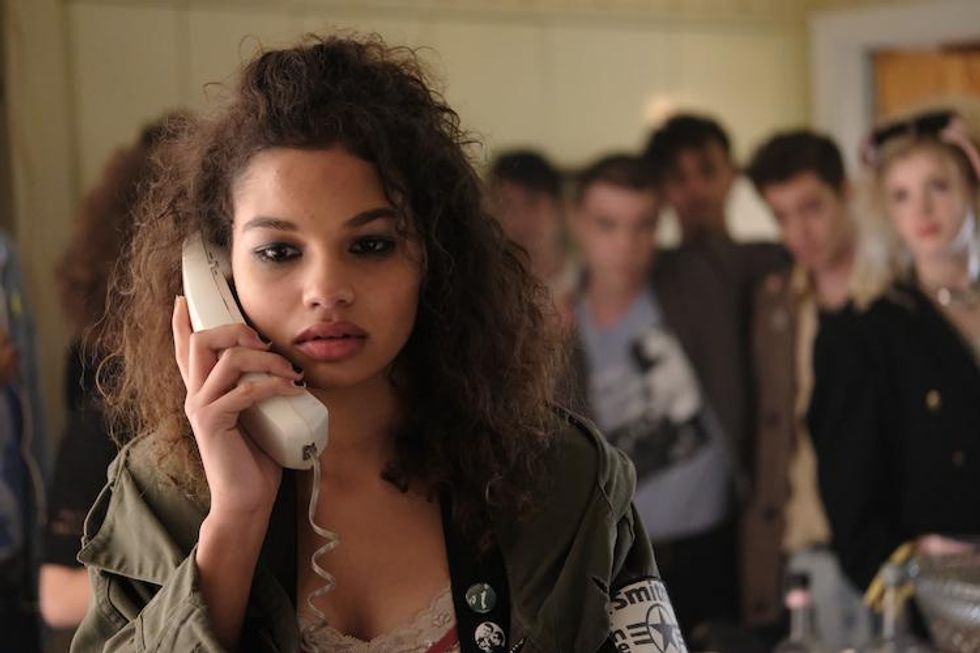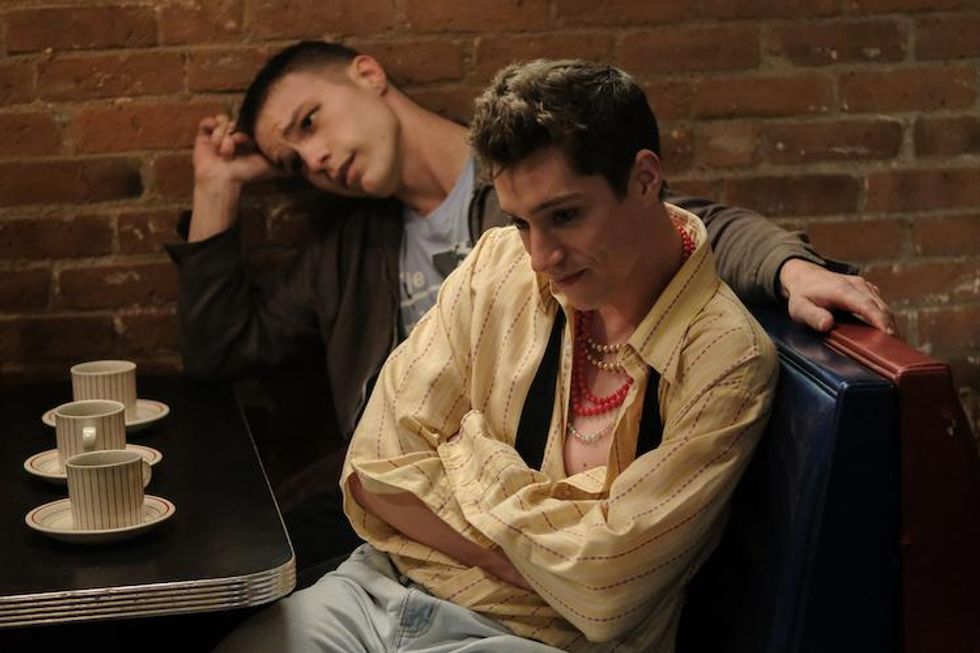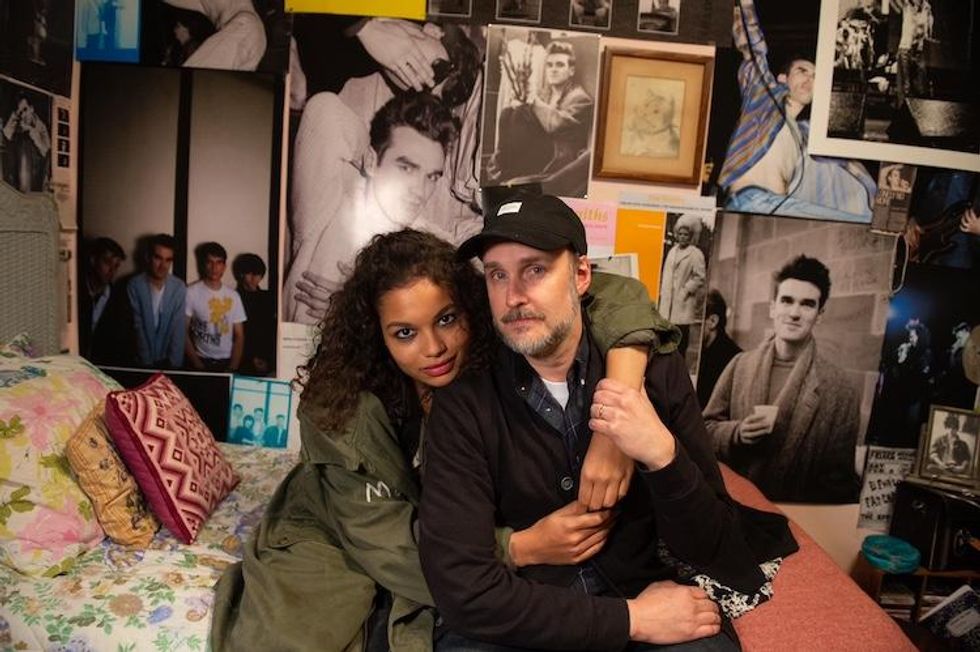You can't quite smell the leather that's "run smooth on the passenger seat" in the character Cleo's vintage Volkswagen Beetle on the day in 1987 that her favorite band, the Smiths, broke up. But gay director (and die-hard Smiths fan) Stephen Kijak's film Shoplifters of the World teems with hallmarks of the era. It's like time traveling to a halcyon moment before tech took over. At the time, as in Kijak's film, sexual and gender fluidity reigned, and arguments about whether one could be cool for loving Madonna and the Cure at the same time felt like life-altering discussions.
The film is, as expected, a love letter to the Smiths and the band's fans -- the soundtrack is packed with classics like "How Soon Is Now," "The Queen Is Dead," and, of course, "Shoplifters of the World Unite." But it's also a gift to the unsung '80s kids who explored gender and sexuality, often without the words or labels to define what it was they were doing. Kijak credits certain musicians of the day for taking some of those leaps -- like Annie Lennox with Eurythmics and the Smiths' dandy of a lead singer, Morrissey (the film self-reflexively nods to the problematic, right-wing politics the onetime rule-breaker would embody decades later).
"We allowed ourselves to exist within a spectrum of mystery. We didn't have to name it; we could perform it and embody things. The music was the soundtrack to that, and it was tribal, and it was expressive," Kijak tells The Advocate.
Of the queerness captured in the film, he adds, "It was subcultural. We took pride in being other. Within those groups there are all sorts of different tones and textures -- you can be a little more punk, you can be a little more new wave, you can be a dandy. And even drag was a lot weirder and edgier back then."

Helena Howard as Cleo
Punctuated with archival interviews of the band, Shoplifters occurs over a 24-hour period in Denver, beginning with a besotted Cleo (Helena Howard of The Wilds and Madeline's Madeline) discovering that the band has called it quits. She and her friends go on an all-night party spree while her crush Dean (Ellar Coltrane), an ennui-laden record store clerk, holds up the local metal-leaning radio station and forces the DJ (Joe Manganiello) to play the Smiths' songbook on rotation. There's a song for every mood in the movie.
Meanwhile, Cleo and her band of relative outsiders composed of Sheila (Elena Kampouris), whose style telegraphs her love of Madonna; Sheila's eyeliner-loving boyfriend Patrick (James Bloor), who's questioning his sexual identity; and Billy (Nick Krause), a good-natured guy off to boot camp for whom gender is beginning to feel mutable, bond over music, sexuality, friendship, and the freedom to wallow in all of it.
The director of the 1996 queer film Never Met Picasso, which starred Alexis Arquette, and the documentaries Scott Walker: 30 Century Man (2006) and Stones in Exile (2010), Kijak was a teen outsider growing up in Cape Cod, Mass., when the Smiths were churning out dramatically queerish tunes like "Hand in Glove" and "This Charming Man." He recalls hearing the band for the first time while sitting on the blue shag carpet of his bedroom listening to Cape Community College's radio station WKKL when he heard the wail of Johnny Marr's guitar.
"That riff from 'How Soon Is Now' just came out of the speakers and just stopped me. I can remember it. I can see my little stereo on the shelf," Kijak recalls.

Nick Krause as Billy and James Bloor as Patrick
The film's star, Howard, wasn't born when the Smiths led the burgeoning gay teen Kijak to find and connect with increasingly cooler and queerer people. But as she had grown up with a mom of the era and with an affinity for the '80s, signing on to Shoplifters felt like kismet for her.
"My mom and her best friend who was like my uncle, they were in that scene growing up in the '80s in New York City and Kentucky and stuff. It was passed down on to me," Howard says.
"There are a few projects that come into your life that feel like they're meant to be, and this project really was because my uncle, he's no longer with us," she says. "He also wanted to be an actor. I feel [it's a] little dedication to him."
In the film, Howard and the other young actors nail the essence of former latch-key kids of the '80s who are on the brink of adulthood but still emotionally felled by the breakup of their favorite band. It didn't hurt that Kijak is "one of the biggest Smiths fans," Howard says about how her mom, her uncle, and her director helped inform her performance. To prep, she also watched archival footage of the period.
While she did her homework, Howard was already versed in all things the Smiths. "Meat Is Murder" is her fave Smiths tune, she handily says of the title track off the band's second studio album, released in 1985. Because she's a vegan, the early animal rights song spoke to her immediately, she says.
During the film's 24-hour odyssey, Cleo and her friends hit up a diner, some parties, parking lots, and a gay bar on the outskirts of town. There's dancing, booze, some drugs, romance, some regrettable sex, and music throughout (courtesy of Dean's siege at the radio station).
The story of the hold-up at the radio station is based on urban myth, while the characters in the film are based on people Kijak knew. There was a real-life Cleo, for instance, an infinitely cool girl from Boston who broke barriers and who introduced his group to a bisexual guy from the city. Kijak says he identifies with Patrick, who begins the night with his girlfriend Sheila and ends up in a romantic situation with Brian, an openly bisexual guy (rare for the time) played by queer Vida star Tonatiuh. But Kijak also shares some traits with Dean, who spends most of the night convincing Manganiello's disc jockey that the Smiths have the power to unite people. Like Dean, Kijak has a past as a disaffected record store clerk.

Howard and Stephen Kijak on set
"I worked at the record store on Main Street in Hyannis. I was the first employee at Spinnaker records. I would just wear my trench coat on the counter and be pretentious and play the Smiths and the Cure," Kijak says. "Cape Cod is a summer, beachy, happy place, and I'm sitting here playing [goth] music. But it became like a cool little hub."
For Howard, the one night in the life of the Denver friends is about a kind of liberation that she says can't exist now due in large part to our devices.
"The biggest thing is technology. And everything's so accessible. You can find anything out about anyone, but it doesn't necessarily have to be the truth, either. Like anyone can make anything up about a person and start a thread or a rumor, and it could take off," Howard says. "Does anyone have time or energy to back up what's being said on the internet? No. Whereas in the '80s, everyone was actually, you know, living."
She acknowledges that people in the LGBTQ+ community were fighting for their lives amid the AIDS crisis at the time the film occurs. And she heralds the groundbreakers who lived authentically then.
"They didn't have time to worry about a definition, a label, or try to figure out what gay or straight meant. You can feel what an attraction is. Like, why do I have to define that or label it? It's about liberating myself and being free."
Shoplifters is about one group of friends on a single day in 1987, but it's also Kijak's experience, and in part, it's the story of Howard's mom and uncle in their youth. It's also about universal self-acceptance. And Howard says it's critical to tell these stories.
"As an outsider myself, I think [visibility] is important. These are the people who haven't been represented and still aren't. We are all outsiders trying to fit in because we feel like we don't belong. Does that mean that you're an outsider?" she muses. "It's very important to tell stories where people feel like they're included because you are included."
Shoplifters of the World is available to rent on VOD now.








































































Charlie Kirk DID say stoning gay people was the 'perfect law' — and these other heinous quotes